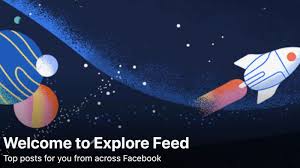Facebook Explore Feed: the opportunity for publishers
The race between Google and Facebook to see which can make itself least popular among content publishers has taken another turn, with Mark Zuckerberg’s company taking a decisive lead. Over the past week publishers in six countries – Slovakia, Sri Lanka, Serbia, Bolivia, Guatemala and Cambodia – have seen their traffic from Facebook fall by up to two thirds as a result of an ongoing test in how publisher content appears within the social network.

In an excellent Medium post flagging up the extent of the change Filip Struhárik, editor and social media manager for Slovakian publisher Dennik N, notes that (emphasis mine):
“In main newsfeeds are now just friend and sponsored posts. Yes, you log into Facebook and you can see only posts from your friends and ads. You have to click on Explore Feed to see posts from pages you follow. If you want your Facebook page posts to be seen in old newsfeed, you have to pay.”
A Facebook spokesperson has indicated that there are currently no plans to expand this test globally, but as I discussed on the Media Voices podcast this week, if Facebook believes this de-prioritisation of publisher content is in its own best interests, then it will happen more widely.
There are legitimate arguments to be made that separating out personal from professional content might eventually work in publishers’ favour, but it’s been a stark reminder – at least for publishers in those six countries – that the power imbalance is in Facebook’s favour.
Publishers have been living under this threat for years. Back in 2015 media analyst Emily Bell warned that publishers were putting too many eggs in Facebook’s basket, saying that while the reintermediation of the internet might help balance publishers’ books in the short-term, it also meant they were surrendering their distribution power:
“If the development of new tools for expression sits solely within Silicon Valley rather than the free press… then I think that’s very bad news indeed.”
Earlier still, analyst Mathew Ingram noted that:
“To the extent that you use a platform to [grow to scale], you are empowering the platform. You’re not necessarily empowering you. To some extent those two things can work together, but in many ways you’re actually helping something that’s in many cases a competitor become stronger.”
This latest test is a sign that the Sword of Damocles is hanging from an increasingly frayed rope. Despite recent efforts from Facebook to try to improve the relationship between it and the publishers who (in theory) provide it with some of the content that keep its users coming back, unilateral decision-making about where publishers fit in Facebook’s grand scheme reinforce where the power lies.
So what can publishers in the UK do to ameliorate the threat that Facebook Explore poses for their traffic?
The most obvious solution is to focus on plurality of distribution channels. While publishers might have lost control of distribution, it does come with a slight silver lining: there are plenty of platforms out there that are potential revenue generators, all of which are amenable to a newspaper or magazine having a presence within their walls. Newswhip reports that publications as varied as National Geographic and LADbible are seeing success within Instagram Stories, and Medium itself is testing new subscription plans designed to attract publishers to its platform.
The second is outreach: while tests like the one that has hit publishers in those six countries are worrying, there are real reasons for hope when it comes to the relationship between Facebook and publishers. The Facebook Journalism Project, and ongoing discussions between the social giant and regional publishers, suggest that Facebook may be listening to publisher concerns.
The third, and most fundamental solution for publishers, is to realise that scale for scale’s sake is undesirable. It was the desire to see traffic grow month on month, without a comprehensive plan to monetise that audience, that led publishers to put so much power in the platforms’ hands in the first place (see our earlier blog on “hit culture”). With more outlets turning to other means of monetisation – whether that’s ecommerce, subscriptions, events or a completely new means of creating revenue – there’s a sea-change coming in how publishers think about digital growth. Events like Facebook’s latest test can only help accelerate that change.